2022年牛津译林版英语中考一轮复习八年级下册Unit 1 课件(共有PPT35张)
文档属性
| 名称 | 2022年牛津译林版英语中考一轮复习八年级下册Unit 1 课件(共有PPT35张) | 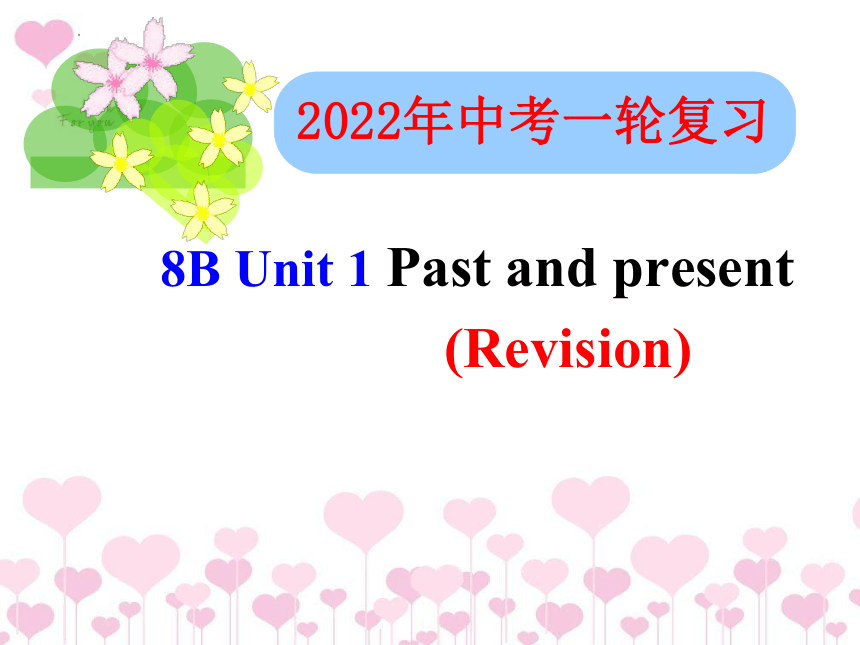 | |
| 格式 | pptx | ||
| 文件大小 | 290.1KB | ||
| 资源类型 | 教案 | ||
| 版本资源 | 牛津译林版 | ||
| 科目 | 英语 | ||
| 更新时间 | 2022-05-05 20:13:40 | ||
图片预览

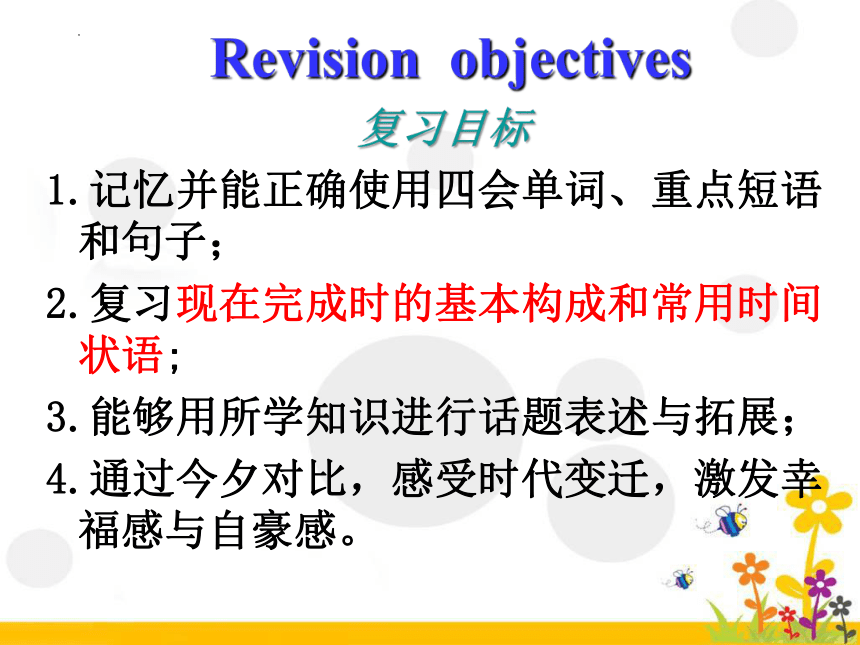
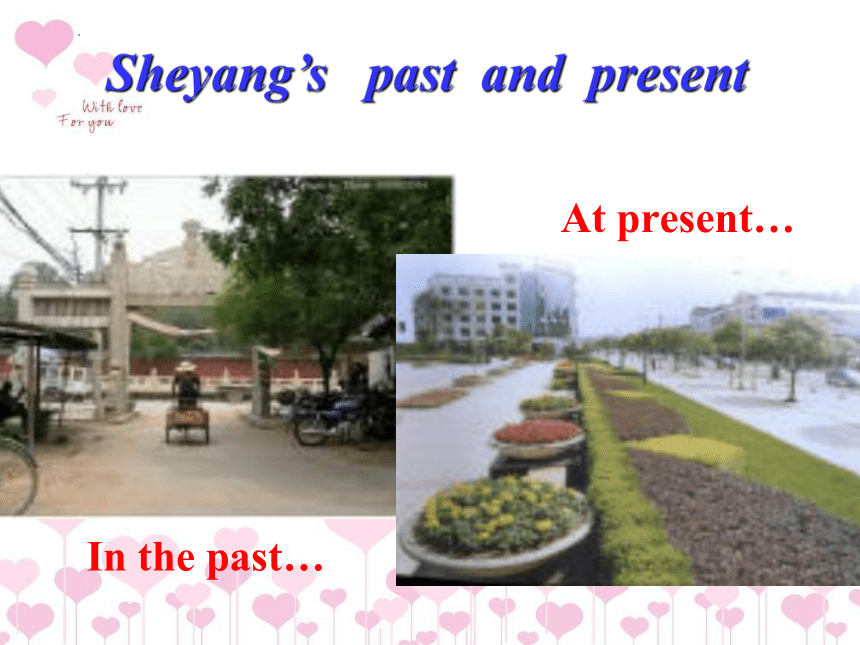
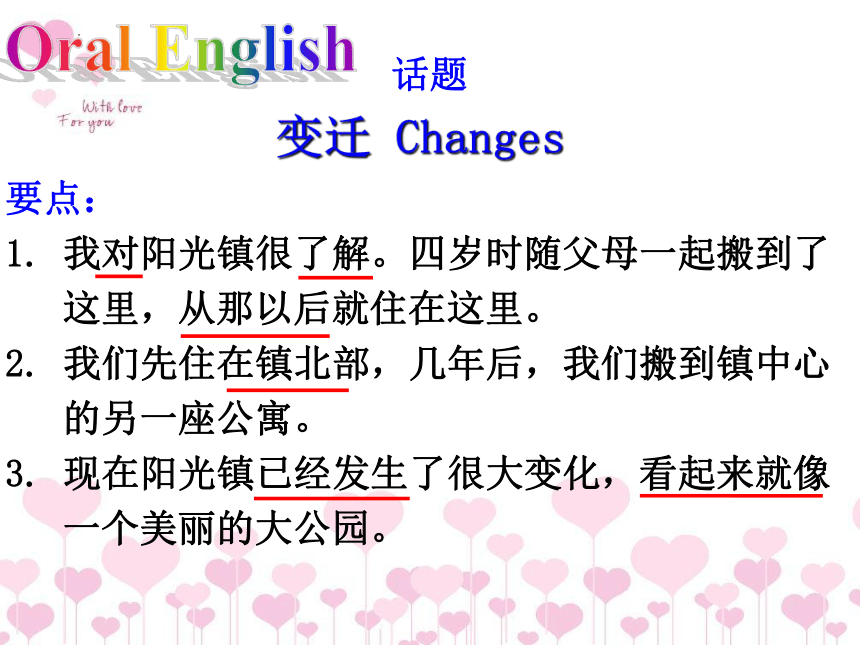
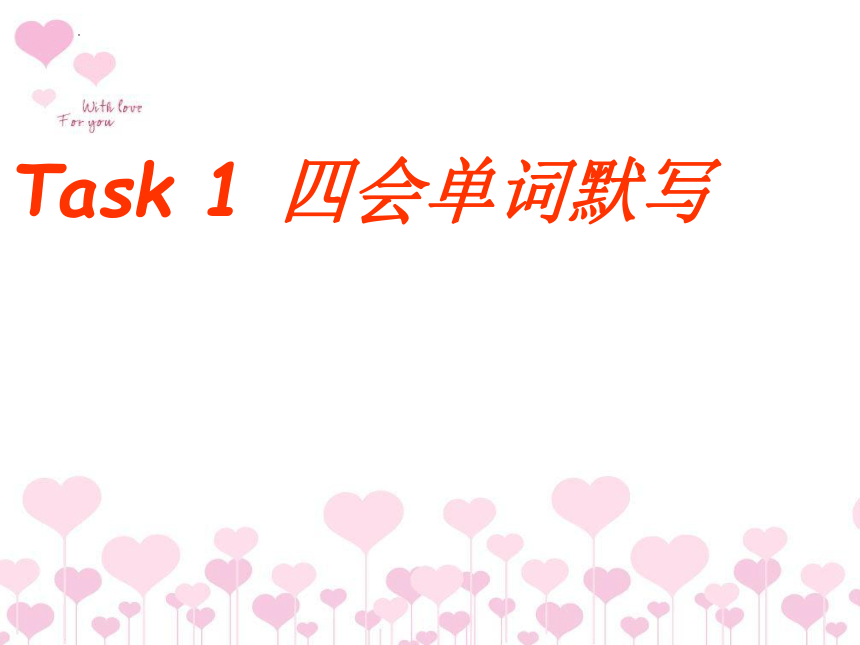
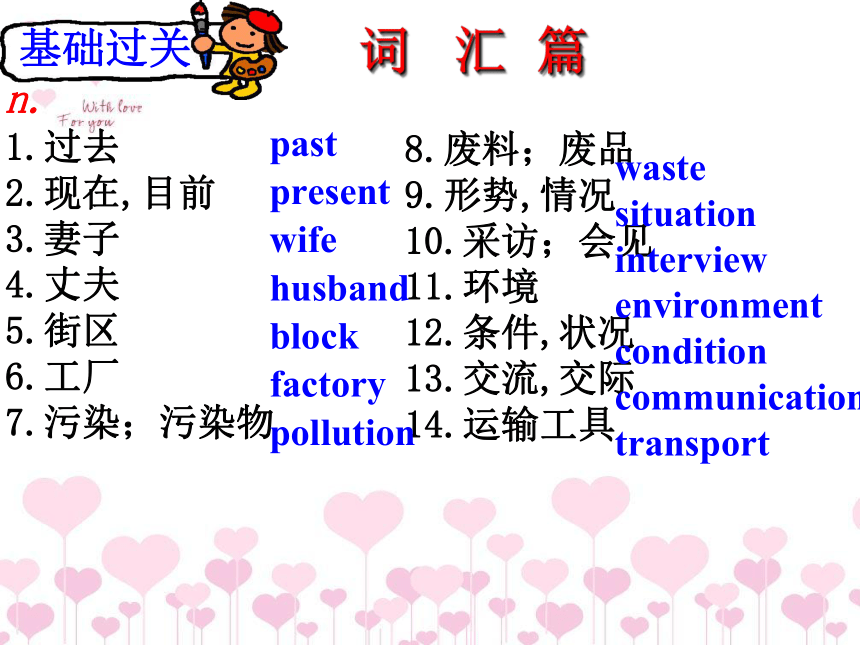
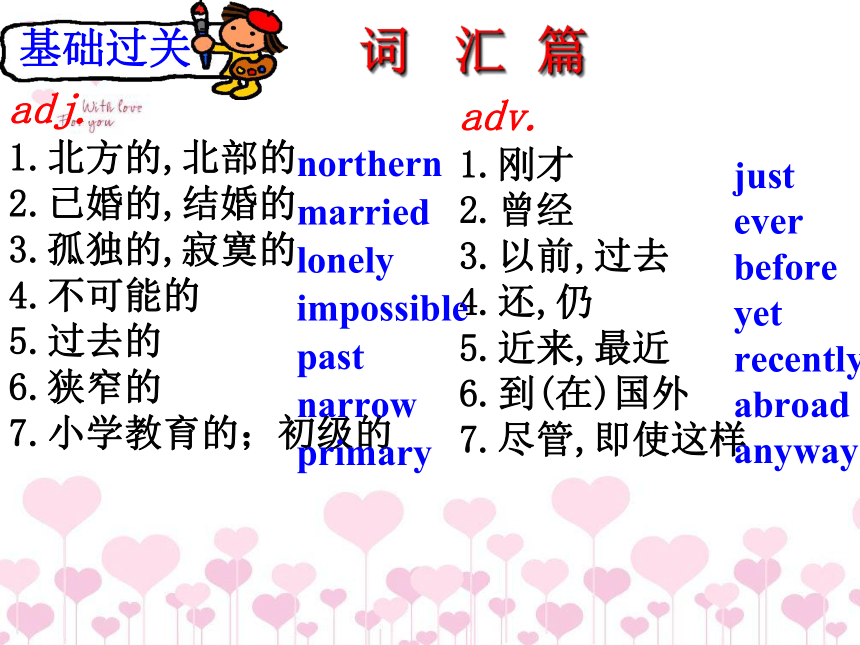
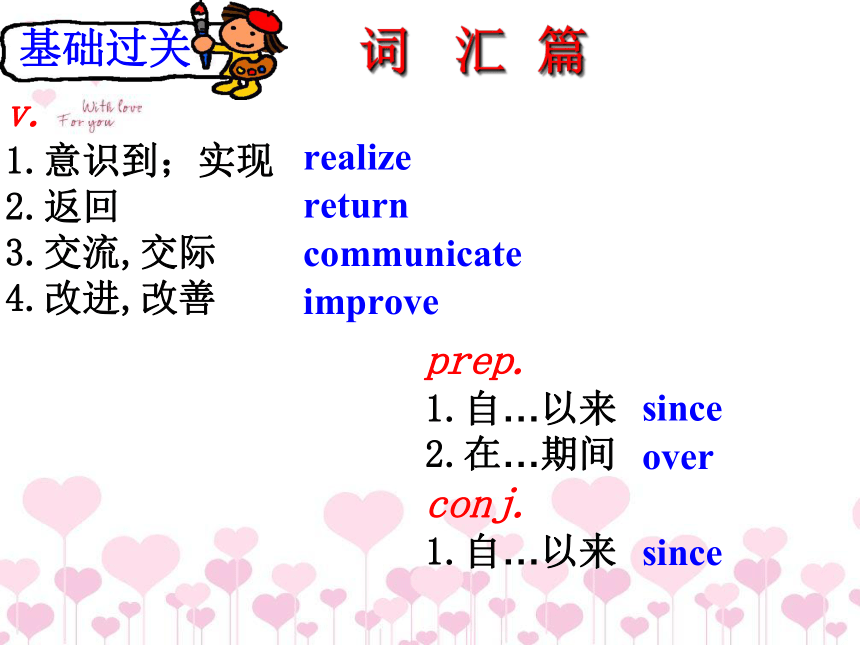
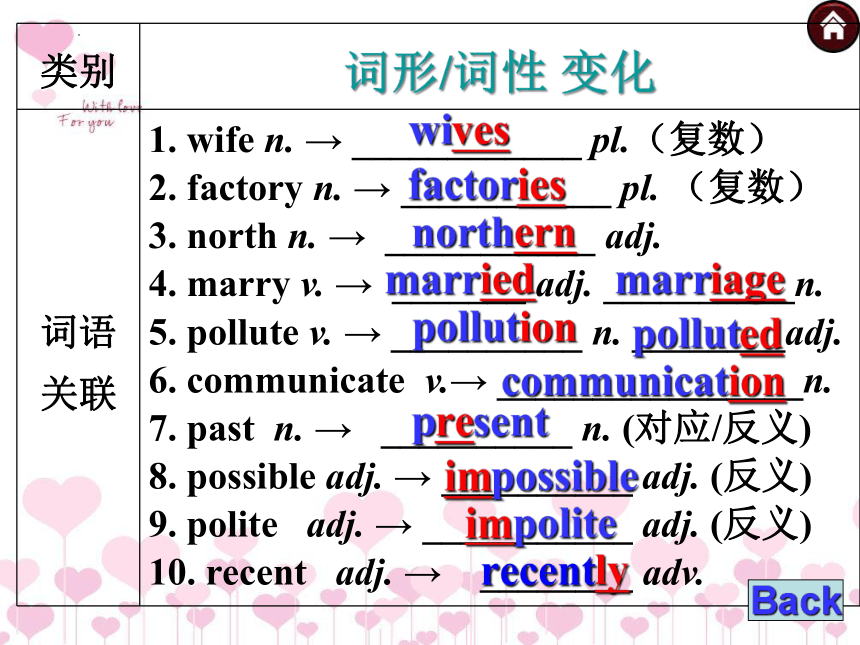
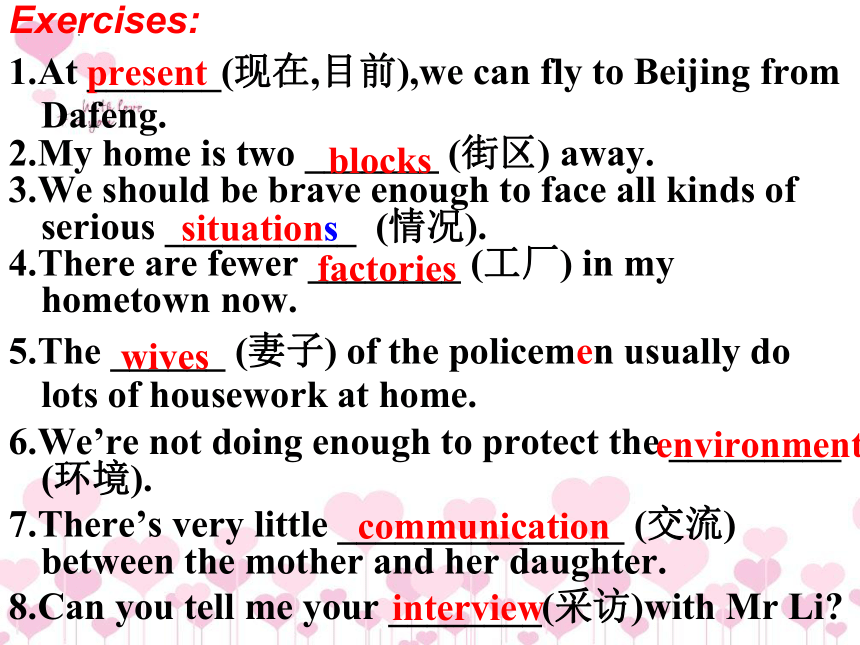
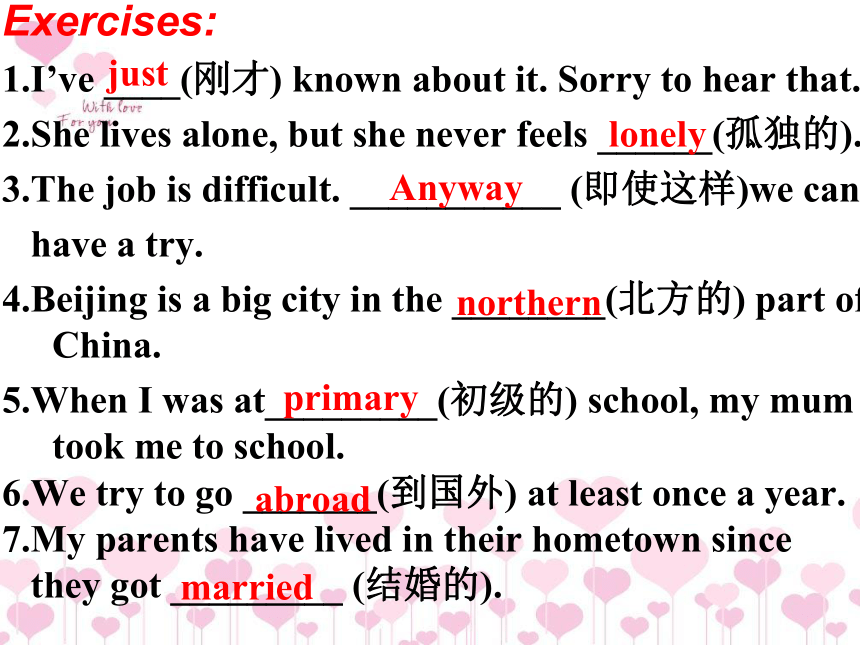
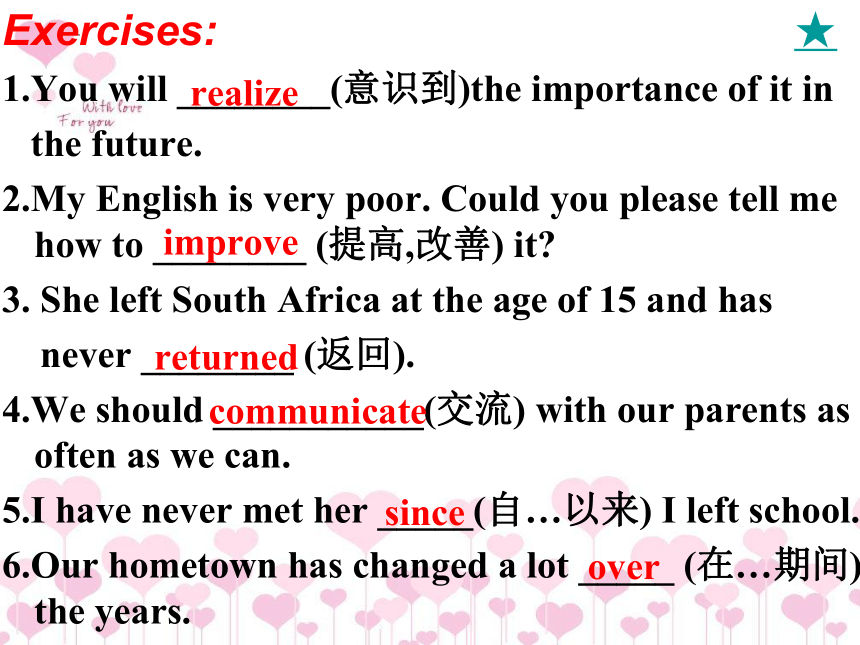
文档简介
(共35张PPT)
2022年中考一轮复习
8B Unit 1 Past and present
(Revision)
Revision objectives
复习目标
1.记忆并能正确使用四会单词、重点短语和句子;
2.复习现在完成时的基本构成和常用时间状语;
3.能够用所学知识进行话题表述与拓展;
4.通过今夕对比,感受时代变迁,激发幸福感与自豪感。
In the past…
At present…
Sheyang’s past and present
话题
变迁 Changes
要点:
1. 我对阳光镇很了解。四岁时随父母一起搬到了这里,从那以后就住在这里。
2. 我们先住在镇北部,几年后,我们搬到镇中心的另一座公寓。
3. 现在阳光镇已经发生了很大变化,看起来就像一个美丽的大公园。
Oral English
Task 1 四会单词默写
词 汇 篇
基础过关
n.
1.过去
2.现在,目前
3.妻子
4.丈夫
5.街区
6.工厂
7.污染;污染物
8.废料;废品
9.形势,情况
10.采访;会见
11.环境
12.条件,状况
13.交流,交际
14.运输工具
past
present
wife
husband
block
factory
pollution
waste
situation
interview
environment
condition
communication
transport
词 汇 篇
基础过关
adv.
1.刚才
2.曾经
3.以前,过去
4.还,仍
5.近来,最近
6.到(在)国外
7.尽管,即使这样
adj.
1.北方的,北部的
2.已婚的,结婚的
3.孤独的,寂寞的
4.不可能的
5.过去的
6.狭窄的
7.小学教育的;初级的
northern
married
lonely
impossible
past
narrow
primary
just
ever
before
yet
recently
abroad
anyway
词 汇 篇
基础过关
v.
1.意识到;实现
2.返回
3.交流,交际
4.改进,改善
realize
return
communicate
improve
prep.
1.自…以来
2.在…期间
conj.
1.自…以来
since
over
since
类别 词形/词性 变化
词语关联 1. wife n. → ____________ pl.(复数)
2. factory n. → ___________ pl. (复数)
3. north n. → ___________ adj.
4. marry v. → _______ adj. __________n.
5. pollute v. → __________ n. ________adj.
6. communicate v.→ ________________n.
7. past n. → __________ n. (对应/反义)
8. possible adj. → __________ adj. (反义)
9. polite adj. → ___________ adj. (反义)
10. recent adj. → ________ adv.
wives
factories
northern
married
marriage
pollution
polluted
communication
present
impossible
impolite
recently
Back
Exercises:
1.At _______(现在,目前),we can fly to Beijing from Dafeng.
2.My home is two _______ (街区) away.
3.We should be brave enough to face all kinds of serious __________ (情况).
4.There are fewer ________ (工厂) in my hometown now.
5.The ______ (妻子) of the policemen usually do lots of housework at home.
6.We’re not doing enough to protect the _________ (环境).
7.There’s very little _______________ (交流) between the mother and her daughter.
8.Can you tell me your ________(采访)with Mr Li
blocks
present
situations
factories
wives
environment
communication
interview
Exercises:
1.I’ve ____(刚才) known about it. Sorry to hear that.
2.She lives alone, but she never feels ______(孤独的).
3.The job is difficult. ___________ (即使这样)we can
have a try.
4.Beijing is a big city in the ________(北方的) part of China.
5.When I was at_________(初级的) school, my mum took me to school.
6.We try to go _______(到国外) at least once a year.
7.My parents have lived in their hometown since
they got _________ (结婚的).
just
lonely
Anyway
northern
primary
abroad
married
Exercises:
1.You will ________(意识到)the importance of it in
the future.
2.My English is very poor. Could you please tell me how to ________ (提高,改善) it
3. She left South Africa at the age of 15 and has
never ________ (返回).
4.We should ___________(交流) with our parents as often as we can.
5.I have never met her _____(自…以来) I left school.
6.Our hometown has changed a lot _____ (在…期间) the years.
realize
improve
returned
communicate
since
over
★
Task2 重点单词辨析
since 自从…(以来)
since 作 “自从(… 以来)” 解时,后面可以接短语或句子(过去时), 主句一般用完成时; 其强调用法是ever since。
1. The railway station has been in service _______
2 years ago.
= The railway station has been in service _______
2 years.
2. They ___________ (live) here since they______
(move) to this city 2 years ago.
3. Jack _________(be) in the army ever since he
_______ (join) it in 2014.
since
for
have lived
moved
has been
joined
marry v. / married adj. / marriage n.
marry sb. (女性) 嫁给某人,(男性) 娶某人
be/get married to sb. 跟某人结婚 (介词不是with)
a happy marriage 幸福的婚姻
a 15 years of marriage 十五年的婚姻 (水晶婚)
1. The couple ______________ (marry) for ten years.
2. The football star loves his girl friend very much and decides to get _____ (marry) to her next month.
3. His parents celebrate their fifteen years of
________ (marry).
4. The boy asks, “Will you _______(嫁给) me ”
5. Is your uncle________ (已婚) or single ?
have/has been married
married
marriage
marry
married
lonely adj. / alone adj. & adv.
lonely 跟“情感”有关:
(指人, 常与feel 连用) 孤独的,寂寞的;
(指物) 孤零零的;
alone 不包含情感色彩,指 “独自” (没有别人相伴或帮助), 义同: by oneself / on one’s own.
1. His grandparents live ________ in a small house, but they don’t feel _________.
2. They went to a ________ place in the mountains.
3. There were many kinds of birds and animals on the island. So the twins were not ___________ and they never felt ________.
alone
lonely
lonely
alone
lonely
return v.
return 返回 = come/get back;
归还 = give … back
返校 _______________ = _______________
归还将这些书
_______________ = ________________
2. 归还它们 _____________
3. 从农村返回城市
_______________________________________
4. Remember to __________ them _______ after
you finish reading these novels. (归还)
return to school
come/get back to school
return … back
return back …
return them = give them back
return to the city from the country
give back
communicate v.
communication n.
交流,交际:用作名词,通常不可数
无论名词或动词,介词均用with
communicate with sb. 与某人交流
= have communication with sb.
He often ______________ (交流) with his teacher in English.
I have no _______________ (交流) with my parents.
现代化技术使得交流比以前更加便捷。
Modern technology _______________________
than before.
communicates
communication
makes communication
abroad adv.
abroad :在国外 = in a foreign country
到国外 = to a foreign country
1. 去国外留学 study ________________
2. 去国外学习深造 go _______ for further study
3. 上周他去国外了。
Last week, he _________________.
4. 你曾去过国外吗?
_______________________________
5. 这家超市里满是国内外的商品。
The supermarket _______________________.
abroad
abroad
went abroad
Have you ever been abroad
is full of goods from both home and abroad
a bit (of) / a little
一点儿钱 _____________________
感到有点儿冷 _____________________
比往常早点儿 _____________________
患了点 (轻微) 感冒 _________________
5. There is _________________ water in the glass.
6. He felt ________________ tired.
a little money/ a bit of money
feel a little / a bit cold
a little / a bit earlier than usual
catch a little / a bit of a clod
a little / a bit of
a little / a bit
a little/bit + adj./adv.
a little + n.
a bit of + n.
Back
used to do sth.
be/get used to (doing) sth.
be used to do
used to do sth. 过去常常做某事
(现在不再做…)
be/get used to (doing) sth.
习惯于(做)某事
be used to do sth. 被用来做某事
(被动语态)
used to do sth. // be/get used to (doing) sth. // be used to do
Knives are used ____________ (cut) things.
The old man has been used to ____________ (live) a simple life.
There used _______ (be) a river in front of my house.
In this area, wood and bamboo are used _______ (help) the children in poor areas.
People in Britain are used to_________ (drive) on the left side of the road.
I used ________ (live) in the country, but now I have got used to ________ (live) in the city.
to cut
living
to be
to help
driving
to live
living
Task 4 重点短语和句子
基础过关
短语篇
基础过关
1.在不同时期/时代 8.感到有点寂寞
2.乘出租车环绕城市 9.像以前一样经常见面
3.过去对我很好 10.把废物排到河里
4.过去和现在 11.自他们结婚以来
5.和我分享食物 12.住在小村庄
6.公交车上人太多 13.搬进新公寓
7.等我上车 14.从美国回来
15.使沟通更容易
16.又窄又脏的公路
17.在街道的两边
at different times
go around the city by taxi
used to be so kind to me
past and present
share food with me
too many people on the bus
wait for me to get on the bus
feel a bit lonely
see each other as often as before
put the waste into the river
since they got married
live in the small village
move into new flats
return from the USA
make communication much easier
narrow and dirty roads
on both sides of the street
★
1.过去你怎么上学?
How________________________________
2.他以前对别人很好。
He _________________________________.
3.他们彼此好久没见面了。
They _________________________a long time.
4.这些年来我们的学校发生了巨大的变化。
Our school________________ over the years.
Great changes _______________ over the years.
5.在某些方面来说,现在的生活比以前好。
____________,the life now is _________________.
6.你曾看到我的雨伞吗?
__________________________________?
句型篇
基础过关
did you go to school in the past
used to be so kind to others
haven’t seen each other for
has changed a lot
have taken place
In some ways
better than before
Have you ever seen my umbrella
1. 我们的城市在有些方面发生了巨大变化
Great changes __________________ in our city.
2. 它这些年里已经变成一个现代化的城市。
It _____________ a modern city ____________.
3. 人们习惯于用电子邮件彼此联系。
They are/get used to _______________ by email.
4.当地人过去常常住在旧房子里,但现在,他们当中大多数人已经搬进了新公寓。
Local people __________ in old houses, but now most of them have ____________ new flats.
5. 因特网使交流容易得多。
The Internet _____________________________.
6. 住在这样的城市,我们感到很自豪。
We feel ______________________________.
have taken place
has turned into
over the years
keeping in touch
used to live
moved into
makes communication much easier
proud to live in a city like this
基础过关
句型篇
7.过去,等下一班公交车要花很久时间。
It ____________________________________ in the past.
8.不管怎样,生活不像以前那么困难了。
__________, life is not____________________________.
9.她和一个电影明星去年结了婚。
She ___________________ a film star last year.
10.他一个人住,但从不感到寂寞。
He___________ , but he never______________ .
11.从那时起,我们就再也没见过。 We___________________________________.
12.你们如何与彼此保持联系的呢?
How ___________________________________ ?
13.他们过去在空闲时间常常听收音机。
They __________________ ____ in their free time.
句型篇
基础过关
took a long time to wait for the next bus
Anyway
as hard/difficult as before
got/was married to
lives alone
feels lonely
haven’t seen each other since then.
do you keep in touch with each other
used to listen to the radio
★
Task 5 语法复习
现在完成时的结构
基本结构:have / has + p.p. (过去分词)
肯定句句:Sb. have/has + p.p….
否定句: Sb. have/has not +p.p….
疑问句: Have/Has sb.+ p.p…
-- Yes, sb. have/has.
-- No, sb. haven’t / hasn’t.
现在完成时常用时间状语
just 肯定句 — “刚刚”
already 肯定句 — “已经”
yet 一般问句 — “已经”
否定句 — “还” (Not yet 还没有)
ever 一般问句/否定句 — “曾经”
never 否定句 — “从不”
recently 表示 “最近,近来”
since 表示 “自……以来”
before 泛指“以前”
for 表示 “(从过去到现在的)一段时间”
all one’s life/lives 某人一生(仍旧活着)
over/in/during the past/last…years在过去的…年中
so far / up to now 截止目前,到目前为止
Can you express them
你会表达吗?
Level 4
Read through the Reading passage and the Task writing.
In the past…
At present…
Homework
Finish off the related work in this unit.
Copy your own article carefully and share it with your classmates.
Thank you
2022年中考一轮复习
8B Unit 1 Past and present
(Revision)
Revision objectives
复习目标
1.记忆并能正确使用四会单词、重点短语和句子;
2.复习现在完成时的基本构成和常用时间状语;
3.能够用所学知识进行话题表述与拓展;
4.通过今夕对比,感受时代变迁,激发幸福感与自豪感。
In the past…
At present…
Sheyang’s past and present
话题
变迁 Changes
要点:
1. 我对阳光镇很了解。四岁时随父母一起搬到了这里,从那以后就住在这里。
2. 我们先住在镇北部,几年后,我们搬到镇中心的另一座公寓。
3. 现在阳光镇已经发生了很大变化,看起来就像一个美丽的大公园。
Oral English
Task 1 四会单词默写
词 汇 篇
基础过关
n.
1.过去
2.现在,目前
3.妻子
4.丈夫
5.街区
6.工厂
7.污染;污染物
8.废料;废品
9.形势,情况
10.采访;会见
11.环境
12.条件,状况
13.交流,交际
14.运输工具
past
present
wife
husband
block
factory
pollution
waste
situation
interview
environment
condition
communication
transport
词 汇 篇
基础过关
adv.
1.刚才
2.曾经
3.以前,过去
4.还,仍
5.近来,最近
6.到(在)国外
7.尽管,即使这样
adj.
1.北方的,北部的
2.已婚的,结婚的
3.孤独的,寂寞的
4.不可能的
5.过去的
6.狭窄的
7.小学教育的;初级的
northern
married
lonely
impossible
past
narrow
primary
just
ever
before
yet
recently
abroad
anyway
词 汇 篇
基础过关
v.
1.意识到;实现
2.返回
3.交流,交际
4.改进,改善
realize
return
communicate
improve
prep.
1.自…以来
2.在…期间
conj.
1.自…以来
since
over
since
类别 词形/词性 变化
词语关联 1. wife n. → ____________ pl.(复数)
2. factory n. → ___________ pl. (复数)
3. north n. → ___________ adj.
4. marry v. → _______ adj. __________n.
5. pollute v. → __________ n. ________adj.
6. communicate v.→ ________________n.
7. past n. → __________ n. (对应/反义)
8. possible adj. → __________ adj. (反义)
9. polite adj. → ___________ adj. (反义)
10. recent adj. → ________ adv.
wives
factories
northern
married
marriage
pollution
polluted
communication
present
impossible
impolite
recently
Back
Exercises:
1.At _______(现在,目前),we can fly to Beijing from Dafeng.
2.My home is two _______ (街区) away.
3.We should be brave enough to face all kinds of serious __________ (情况).
4.There are fewer ________ (工厂) in my hometown now.
5.The ______ (妻子) of the policemen usually do lots of housework at home.
6.We’re not doing enough to protect the _________ (环境).
7.There’s very little _______________ (交流) between the mother and her daughter.
8.Can you tell me your ________(采访)with Mr Li
blocks
present
situations
factories
wives
environment
communication
interview
Exercises:
1.I’ve ____(刚才) known about it. Sorry to hear that.
2.She lives alone, but she never feels ______(孤独的).
3.The job is difficult. ___________ (即使这样)we can
have a try.
4.Beijing is a big city in the ________(北方的) part of China.
5.When I was at_________(初级的) school, my mum took me to school.
6.We try to go _______(到国外) at least once a year.
7.My parents have lived in their hometown since
they got _________ (结婚的).
just
lonely
Anyway
northern
primary
abroad
married
Exercises:
1.You will ________(意识到)the importance of it in
the future.
2.My English is very poor. Could you please tell me how to ________ (提高,改善) it
3. She left South Africa at the age of 15 and has
never ________ (返回).
4.We should ___________(交流) with our parents as often as we can.
5.I have never met her _____(自…以来) I left school.
6.Our hometown has changed a lot _____ (在…期间) the years.
realize
improve
returned
communicate
since
over
★
Task2 重点单词辨析
since 自从…(以来)
since 作 “自从(… 以来)” 解时,后面可以接短语或句子(过去时), 主句一般用完成时; 其强调用法是ever since。
1. The railway station has been in service _______
2 years ago.
= The railway station has been in service _______
2 years.
2. They ___________ (live) here since they______
(move) to this city 2 years ago.
3. Jack _________(be) in the army ever since he
_______ (join) it in 2014.
since
for
have lived
moved
has been
joined
marry v. / married adj. / marriage n.
marry sb. (女性) 嫁给某人,(男性) 娶某人
be/get married to sb. 跟某人结婚 (介词不是with)
a happy marriage 幸福的婚姻
a 15 years of marriage 十五年的婚姻 (水晶婚)
1. The couple ______________ (marry) for ten years.
2. The football star loves his girl friend very much and decides to get _____ (marry) to her next month.
3. His parents celebrate their fifteen years of
________ (marry).
4. The boy asks, “Will you _______(嫁给) me ”
5. Is your uncle________ (已婚) or single ?
have/has been married
married
marriage
marry
married
lonely adj. / alone adj. & adv.
lonely 跟“情感”有关:
(指人, 常与feel 连用) 孤独的,寂寞的;
(指物) 孤零零的;
alone 不包含情感色彩,指 “独自” (没有别人相伴或帮助), 义同: by oneself / on one’s own.
1. His grandparents live ________ in a small house, but they don’t feel _________.
2. They went to a ________ place in the mountains.
3. There were many kinds of birds and animals on the island. So the twins were not ___________ and they never felt ________.
alone
lonely
lonely
alone
lonely
return v.
return 返回 = come/get back;
归还 = give … back
返校 _______________ = _______________
归还将这些书
_______________ = ________________
2. 归还它们 _____________
3. 从农村返回城市
_______________________________________
4. Remember to __________ them _______ after
you finish reading these novels. (归还)
return to school
come/get back to school
return … back
return back …
return them = give them back
return to the city from the country
give back
communicate v.
communication n.
交流,交际:用作名词,通常不可数
无论名词或动词,介词均用with
communicate with sb. 与某人交流
= have communication with sb.
He often ______________ (交流) with his teacher in English.
I have no _______________ (交流) with my parents.
现代化技术使得交流比以前更加便捷。
Modern technology _______________________
than before.
communicates
communication
makes communication
abroad adv.
abroad :在国外 = in a foreign country
到国外 = to a foreign country
1. 去国外留学 study ________________
2. 去国外学习深造 go _______ for further study
3. 上周他去国外了。
Last week, he _________________.
4. 你曾去过国外吗?
_______________________________
5. 这家超市里满是国内外的商品。
The supermarket _______________________.
abroad
abroad
went abroad
Have you ever been abroad
is full of goods from both home and abroad
a bit (of) / a little
一点儿钱 _____________________
感到有点儿冷 _____________________
比往常早点儿 _____________________
患了点 (轻微) 感冒 _________________
5. There is _________________ water in the glass.
6. He felt ________________ tired.
a little money/ a bit of money
feel a little / a bit cold
a little / a bit earlier than usual
catch a little / a bit of a clod
a little / a bit of
a little / a bit
a little/bit + adj./adv.
a little + n.
a bit of + n.
Back
used to do sth.
be/get used to (doing) sth.
be used to do
used to do sth. 过去常常做某事
(现在不再做…)
be/get used to (doing) sth.
习惯于(做)某事
be used to do sth. 被用来做某事
(被动语态)
used to do sth. // be/get used to (doing) sth. // be used to do
Knives are used ____________ (cut) things.
The old man has been used to ____________ (live) a simple life.
There used _______ (be) a river in front of my house.
In this area, wood and bamboo are used _______ (help) the children in poor areas.
People in Britain are used to_________ (drive) on the left side of the road.
I used ________ (live) in the country, but now I have got used to ________ (live) in the city.
to cut
living
to be
to help
driving
to live
living
Task 4 重点短语和句子
基础过关
短语篇
基础过关
1.在不同时期/时代 8.感到有点寂寞
2.乘出租车环绕城市 9.像以前一样经常见面
3.过去对我很好 10.把废物排到河里
4.过去和现在 11.自他们结婚以来
5.和我分享食物 12.住在小村庄
6.公交车上人太多 13.搬进新公寓
7.等我上车 14.从美国回来
15.使沟通更容易
16.又窄又脏的公路
17.在街道的两边
at different times
go around the city by taxi
used to be so kind to me
past and present
share food with me
too many people on the bus
wait for me to get on the bus
feel a bit lonely
see each other as often as before
put the waste into the river
since they got married
live in the small village
move into new flats
return from the USA
make communication much easier
narrow and dirty roads
on both sides of the street
★
1.过去你怎么上学?
How________________________________
2.他以前对别人很好。
He _________________________________.
3.他们彼此好久没见面了。
They _________________________a long time.
4.这些年来我们的学校发生了巨大的变化。
Our school________________ over the years.
Great changes _______________ over the years.
5.在某些方面来说,现在的生活比以前好。
____________,the life now is _________________.
6.你曾看到我的雨伞吗?
__________________________________?
句型篇
基础过关
did you go to school in the past
used to be so kind to others
haven’t seen each other for
has changed a lot
have taken place
In some ways
better than before
Have you ever seen my umbrella
1. 我们的城市在有些方面发生了巨大变化
Great changes __________________ in our city.
2. 它这些年里已经变成一个现代化的城市。
It _____________ a modern city ____________.
3. 人们习惯于用电子邮件彼此联系。
They are/get used to _______________ by email.
4.当地人过去常常住在旧房子里,但现在,他们当中大多数人已经搬进了新公寓。
Local people __________ in old houses, but now most of them have ____________ new flats.
5. 因特网使交流容易得多。
The Internet _____________________________.
6. 住在这样的城市,我们感到很自豪。
We feel ______________________________.
have taken place
has turned into
over the years
keeping in touch
used to live
moved into
makes communication much easier
proud to live in a city like this
基础过关
句型篇
7.过去,等下一班公交车要花很久时间。
It ____________________________________ in the past.
8.不管怎样,生活不像以前那么困难了。
__________, life is not____________________________.
9.她和一个电影明星去年结了婚。
She ___________________ a film star last year.
10.他一个人住,但从不感到寂寞。
He___________ , but he never______________ .
11.从那时起,我们就再也没见过。 We___________________________________.
12.你们如何与彼此保持联系的呢?
How ___________________________________ ?
13.他们过去在空闲时间常常听收音机。
They __________________ ____ in their free time.
句型篇
基础过关
took a long time to wait for the next bus
Anyway
as hard/difficult as before
got/was married to
lives alone
feels lonely
haven’t seen each other since then.
do you keep in touch with each other
used to listen to the radio
★
Task 5 语法复习
现在完成时的结构
基本结构:have / has + p.p. (过去分词)
肯定句句:Sb. have/has + p.p….
否定句: Sb. have/has not +p.p….
疑问句: Have/Has sb.+ p.p…
-- Yes, sb. have/has.
-- No, sb. haven’t / hasn’t.
现在完成时常用时间状语
just 肯定句 — “刚刚”
already 肯定句 — “已经”
yet 一般问句 — “已经”
否定句 — “还” (Not yet 还没有)
ever 一般问句/否定句 — “曾经”
never 否定句 — “从不”
recently 表示 “最近,近来”
since 表示 “自……以来”
before 泛指“以前”
for 表示 “(从过去到现在的)一段时间”
all one’s life/lives 某人一生(仍旧活着)
over/in/during the past/last…years在过去的…年中
so far / up to now 截止目前,到目前为止
Can you express them
你会表达吗?
Level 4
Read through the Reading passage and the Task writing.
In the past…
At present…
Homework
Finish off the related work in this unit.
Copy your own article carefully and share it with your classmates.
Thank you
